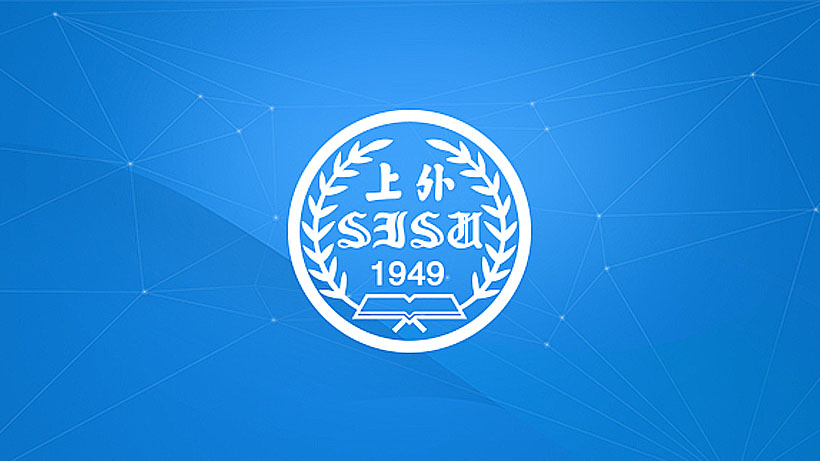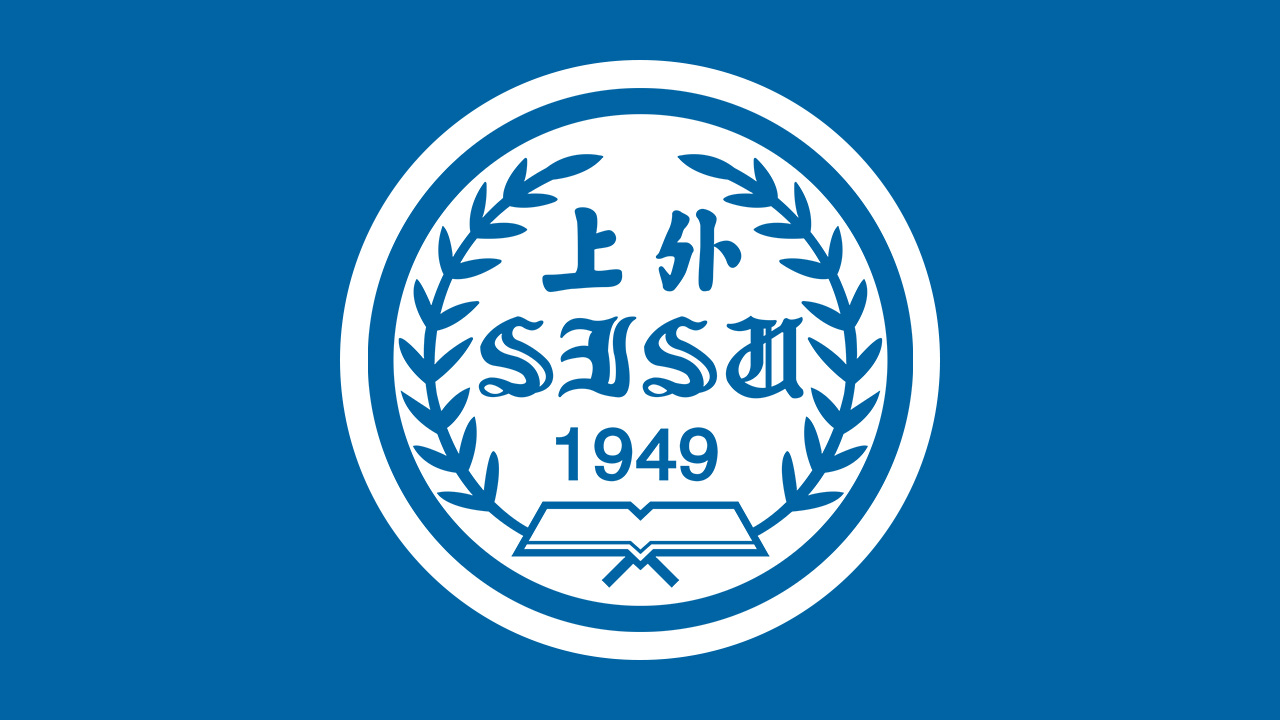本讲座将讨论人类新闻传播的历史、语言、文字、新闻业的起源,并聚焦国别新闻史研究。
新闻报道

本讲座将讨论人类新闻传播的历史、语言、文字、新闻业的起源,并聚焦国别新闻史研究。
新闻报道
本讲座将聚焦新闻传播学学术研究要义,诠释新媒体语境下的新闻传播学学术研究特点、需要掌握的主要知识以及论文选题方法与路径,介绍新闻传播学研究规范以及写作流程。
新闻报道

在现代汉语普通话中,“给”可以作为被动标记用于被动句中。关于北京话中“给”表被动用法的形成,影响最大的是“给予-致使-被动”演变说,认为“给”的被动用法由致使用法发展来的。清中叶以来北京官话中没有“给”表致使的用法,缺少从给予动词演变为被动标记的中间环节,北京话被动标记“给”并非自源性成分,而是来自南京官话的外源性成分。“给短被动”无论在普通话还是北京话中都不存在,“给短被动”其实是一个蒙受助词,在早期北京话中就大量存在,是北京话自源性成分,是受益受损助词“给”语义演变和进一步语法化的结果。
新闻报道

汉语没有限定动词与非限定动词的句法形态,句法整合的方式与形态语言有所不同。汉语依附性小句有两种基本类型:1)关联词语标记型:依赖关联词语实现的依附性关系。2)无关联词语标记型:通过句法范畴特征实现依附性关系。无关联词语标记的小句,其句法自立性取决于小句的及物性高低。小句间的及物性落差越大,低及物性小句的依附性越强。句法上的整合也具有语体差异,不同语体对句法整合的要求不同。叙事语体中,零形主语小句是句法整合的重要手段。
新闻报道

10月25日下午,由上海外国语大学和上海中国书法院联合举办的“上海外国语大学五大洲留学生书法展”在上海外语教育出版社开幕,来自高校、机关、媒体和书法爱好者等各界嘉宾百余人参加开幕式并参观了书法展。此次展览共展出来自尼日利亚、韩国、俄罗斯、巴基斯坦、乌克兰等近20个国家的留学生的超过70幅书法作品,包涵篆、隶、楷、行、草五种书体,表现内容广博,经史子集、诗词歌赋,均有涉猎,上外学子们以各自极富个性特征、民族特色的中国书法作品,表达对书法之美的深切热爱、对中国的由衷祝愿以及对母校的诚挚祝福。展览将持续至11月3日。
新闻报道

中阿改革发展研究中心智库讲座系列第一讲:阿拉伯国家热点频出,地区局势复杂。中阿改革发展研究中心特聘研究员、前中国中东问题特使宫小生将为大家讲授调研报告写作的基本要求与写作技巧,并结合具体文章做案例分析。
新闻报道

The first part of the lecture is devoted to the genesis of the Basic Law and the significance of the two - democratic - predecessor constitutions of 1919 and 1849 for this purpose, which also largely explains the basic structure of the Basic Law chosen in 1949. First, the structure of the German state and its organs is presented, which is more open in the Basic Law than the system of government has developed rapidly (see the gradual shifts in emphasis towards cooperative/unitarian federalism or "chancellor democracy"). Starting from the observation that, in contrast to the Weimar Constitution from 1919, there are no provisions on an economic and social constitution, this current view of the Basic Law as a concise "working order" of the federal state is abandoned and, on the basis of the catalogue of fundamental rights, its novelty is shown as a "preamble" to the entire constitutional and legal order of Germany. This now also reveals the human and social image from which the Basic Law proceeds. In addition, the economic and social constitution of the Basic Law, i.e. the social market economy and its design, also results from this. This anchoring of the social market economy above all in the catalogue of fundamental rights is briefly compared with the theses of attempts at interpretation inspired by Soviet Communism in the relevant articles on fundamental rights.
In the next section, the numerous amendments to the Basic Law over the period of 70 years are examined and classified against the respective socio-political background (e.g. several constitutional reforms towards more or less unitarian federalism, etc.). The result of these different constitutional amendments is a partial rejection of regulatory structural decisions for the Basic Law of 1949 and an increased tendency to establish political compromises between the political parties in the constitution on the one hand and to charge the Basic Law with program sentences (which were deliberately dispensed with in 1949) on the other hand.
At least this is followed by a final outlook: Since the increasing overload of technical legal details on the one hand, and political program or target clauses on the other, is making the Basic Law and even the catalogue of fundamental rights increasingly incomprehensible, this tendency of constitutional development stands in the way of a role for the Basic Law as a document that creates identity. The model of constitutional patriotism presupposes that the constitution can continue to be read and understood by all citizens and not just by experts if they are to be able to identify with it. This is an essential reason for the continued broadest social acceptance of the Basic Law and thus for the legitimacy of our entire constitutional order. As a counter-example, reference is made here to the Weimar Constitution, which ultimately lost its legitimacy in the eyes of the majority of the people due to a lack of success - i.e. due to a lack of real significance of its numerous postulated guarantees for the individual citizen.
新闻报道

新闻报道
In an age where writing and the old technology of print has been all but displaced by computers and screens, this seminar will ask: what happens to realism and the novel in the contemporary context? New developments in Digital Humanities promise to widen the scale of how we understand the novel, changing our definition not only of what the novel is but also our notions of where it comes from and when. In Franco Moretti’s work with large data sets and algorithmic “surface reading,” for example, the restricted list of Western canonical literature is displaced. Broader arrays of novels are enumerated in a way that is more massive—and worldlier—than ever. But here again (recalling Bacon) we must ask a question about media, scale, and the real world: How is “the real” expanded and therefore reconstructed as we move between the new technology and the old? If the early modern novel made its claim for realism by enlarging what fiction is and what it does, then might we think about a new realism that goes further than the earlier one with the same agenda of reality expansion? This question introduces a new prospect for the novel, exceeding one of its original touchstones: the veracity of human experience, and even the ontological primacy of the human being per se. Contemporary examples of what we might call eco-realism seek to foster new relationships between reality and human experience. By exploring what Bruno Latour calls a “democracy of things,” contemporary writers such as Octavia Butler, Richard Powers, and Amitav Gosh present examples of the realist novel where “the real” is not reducible to anthropomorphic scales, categories, or time lines. However, rather than seeing this development as a break from early modern fiction, we will consider eco-realism as the opportunity to discover a worldlier history of literature, a future of and for the novel that was already part of its past.
新闻报道
This seminar will discuss the origins of the English novel in the eighteenth century, focusing specifically on the relationship between genre and realism. We will be interested in defining key features of the form as it emerged alongside other important social and political developments: bourgeois social organization, capitalism, and empire. More importantly, our goal will be to explain the role that genre plays in Western theories about how human beings understand and experience the world. As part of the period known as the Enlightenment, philosophy, or what was simply called “science,” seeks to distance itself from religious and other forms of epistemic orthodoxy. By turning to empiricism, knowledge proposes to affirm—as Francis Bacon says—the world “as it really is.” The English novel, too, began by advancing the same proposition: to depict reality as it is, and embrace our common experience of “the real”. By proposing to include any human being capable of rational thought, eighteenth-century realist fiction became the West’s first popular literary form. The novel gave writing the unprecedented status of being part of mass culture, just as it sought to depict scenes taken from what Jurgen Habermas calls the “public sphere.” But in fact, as Habermas also says, the “public” was comprised of far fewer people than the term “human” would idealistically imply. The laboring majority (e.g. peasants, women, and slaves) were regarded as the “multitude” or the “masses,” and not part of “the public sphere.” How does this social contradiction illuminate a philosophical (and technical) problem that runs along the same lines? What about the relationship between massiveness and reality as an Enlightenment “scientific” problem, one that is dependent on what kind of media tools we use designate “the real”? Our goal will be to show how the novel represents the “the real” as a problem of enlargement, and how—recalling Adam Smith—fiction is used in the eighteenth-century to help us sort, sequence, and classify reality at its full and often overwhelming scale.
新闻报道